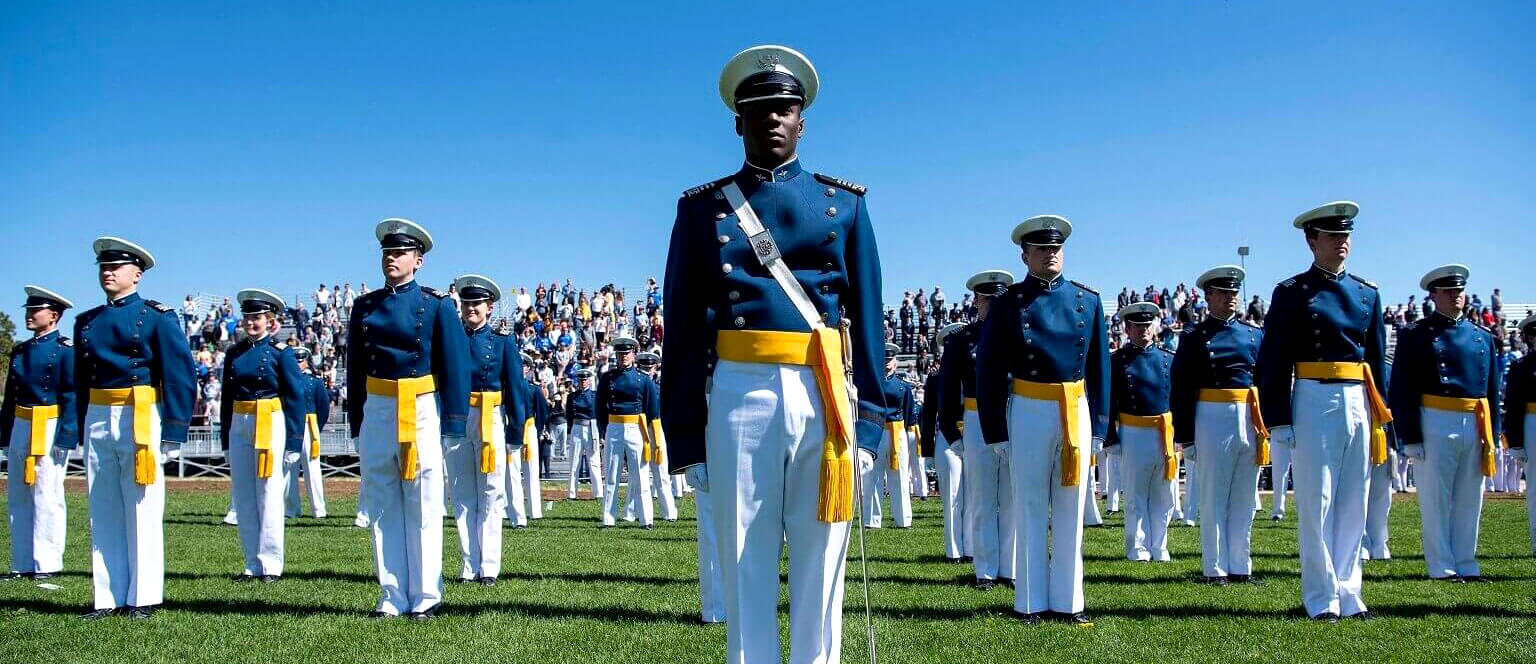Outcomes

The U.S. Air Force Academy is a unique institution, providing an elite undergraduate educational program, a world-class training program in the profession of arms, a rigorous four-year regimen of physical education classes and competitive athletics, and a continuous grounding in character development. However, the most unique characteristic of the Academy is how these distinct elements work together toward the shared mission of producing leaders of character, motivated to lead the Air Force and Space Force in service to our nation. The synergy of these distinct elements allows us to offer an integrated four-year experience that is greater than the sum of its individual parts.
By the time cadets graduate from the Academy and commission as second lieutenants, we expect them to acquire a sophisticated combination of knowledge, skills, and responsibilities that they will need to succeed as airmen, guardians, and citizens. We have described these characteristics in the following nine U.S. Air Force Academy Institutional Outcomes:
CRITICAL THINKING
Upon graduation, our graduates will be required to identify and solve complex problems and effectively respond to situations they have not previously confronted. Acting responsibly in an ever-changing world of ill-defined problems requires critical thinking. At the Academy, critical thinking is defined as: The process of self-aware, informed, and reflective reasoning for problem-solving and decision-making in the absence of ideal information.
Critical Thinking Outcome Team Lead: Dr. Jill Harris
Learn more – Critical Thinking White Paper and Proficiencies
APPLICATION OF ENGINEERING PROBLEM-SOLVING METHODS
Graduating cadets will recognize the engineering and technical challenges of the Air Force mission and the physical capabilities and limits within their assigned career fields and weapon systems. These officers need to not only be “operators,” but to become problem solvers that use engineering principles to devise enhanced capabilities essential to achieving and maintaining Air Force dominance in air, space, and cyberspace.
Engineering Outcome Team Lead: Lt Col Daniel Showalter
Learn more about the Engineering Outcome
SCIENTIFIC REASONING AND THE PRINCIPLES OF SCIENCE
The Air Force needs science-proficient officers who can make decisions in a world increasingly influenced by scientific and quantitative data. Therefore, the goal of this outcome is to develop science-proficient officers, officers who exercise scientific habits of mind, including proficiency in the Nature of Science, Scientific Reasoning, and the Principles of Science.
Science Outcome Team Lead: Dr. Joseph Eichholz
Learn more about the Science Outcome
THE HUMAN CONDITION, CULTURES, AND SOCIETIES
Our graduates will be required to interact successfully with a wide range of individuals, including those representing cultures and societies different from their own. To foster their success in these interactions, the Academy has created a three-phased approach to help cadets better understand the human condition, cultures, and societies: (a) knowing oneself; (b) knowing others; and (c) constructive engagement. Being able to prudently interact with individuals from different milieus resides at the heart of intercultural or cross-cultural competence and includes both domestic and international environments.
Human Condition Outcome Team Lead: Dr. Peter Swanson
Learn more about the Human Condition Outcome
LEADERSHIP, TEAMWORK, AND ORGANIZATIONAL MANAGEMENT
The Academy develops leaders through implementation of the Officer Development System, particularly the PITO model, which organizes leadership capabilities into four broad categories of (a) Personal Leadership (i.e., leading oneself in ways that enhance mission accomplishment); (b) Interpersonal Leadership (i.e., leading one or more other people); (c) Team Leadership (i.e., leading an interdependent group toward accomplishment of a common goal); and (d) Organizational Leadership (i.e., guiding an organization to success while understanding that it is embedded within a larger institution and environment).
Leadership Outcome Team Lead: Lt Col Matthew Orlowsky
Learn more about the Leadership Outcome
CLEAR COMMUNICATION
Clear communication is a complex, nuanced, and teachable practice essential for successful officers and leaders of character. Effective use of oral, visual, written, and aural modes of communication signifies the professional competence and knowledge expected in a leader while engendering the trust of those being led. Officers must routinely assess context, understand purpose, develop processes, know audiences, and employ the materials necessary to plainly convey intentions in documents that range from staff work and simple orders to strategic plans and systematic designs: in short, tell the Air Force and Space Force story.
Communication Outcome Team Lead: Lt Col Timothy Frank
Learn more about the Communication Outcome
ETHICS AND RESPECT FOR HUMAN DIGNITY
When deciding how to act, Air Force leaders of character comprehend moral knowledge and ethical alternatives, respect the dignity of all affected persons, use ethical judgment in moral decision-making as leaders to select the best alternative, and act consistently with that judgment so as to develop habits of moral excellence.
Ethics and Respect Outcome Team Lead: Dr. Paul Macdonald
NATIONAL SECURITY OF THE AMERICAN REPUBLIC
“National Security” commonly refers to “the ability of the state to protect the fundamental values and core interests of a society.” Within the broader objective that cadets be prepared to “defend our nation in air, space, and cyberspace,” this Outcome emphasizes not only the operational, tactical, and technological capabilities necessary to do so but also the broader political context in which military force must be employed.
National Security Outcome Team Lead: Dr. Paul Bezerra
Learn more about the National Security Outcome
WARRIOR ETHOS AS AIRMEN AND GUARDIANS
Warrior ethos is the embodiment of the warrior spirit: tough-mindedness, tireless motivation, unceasing vigilance, a willingness to sacrifice one’s life for the country, if necessary, and a commitment to be the world’s premier air, space and cyberspace force. The warrior ethos proficiencies comprise a structure that is based on the intellectual development inherent to the Profession of Arms, and the values development prescribed by the Air Force Core Values.
Warrior Ethos Outcome Team Lead: Dr. Justin Stoddard & Lt Col Nicholas Reynolds